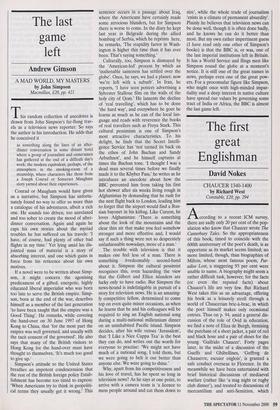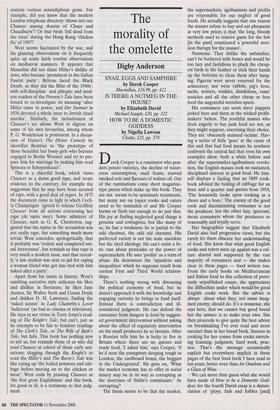The first great Englishman
David Nokes
CHAUCER 1340-1400 According to a recent ICM survey, there are sadly only 20 per cent of the pop- ulation who know that Chaucer wrote The Canterbury Tales. So the appropriateness of this book, timed to coincide with the 600th anniversary of the poet's death, is as opportune as its market seems limited; no more limited, though, than biographies of Milton, whose most famous poem, Par- adise Lost, a staggering 93 per cent were unable to name. A biography might seem a rather difficult task, however, for the facts (or even the reputed facts) about Chaucer's life are very few. But Richard West takes this as an advantage, offering his book as a leisurely stroll through a world of Chaucerian bric-à-brac, in which the poet himself makes only occasional entries. Thus on p. 94, amid a general dis- cussion of the role of Ovid in education, we find a note of Eliza de Burgh, itemising the purchase of a short jacket, a pair of red and black hose and a pair of shoes for the young `Gaifrido Chaucer'. Forty pages later, in the midst of a discussion of the Guelfs and Ghibellines, `Geffrog de Chauserre, escuier englois', is granted a safe conduct overseas to Florence. In the meanwhile we have been entertained with brief historical discussions of mediaeval warfare (rather like 'a stag night or rugby club dinner'), and treated to discussions of mercantilism and anti-Semitism, which contain various serendipitous gems. For example, did you know that the modern London telephone directory 'shows not one Chaucer among dozens of Chaus and Chaudhuris'? Or that birds 'fell dead from the trees' during the Hong Kong 'chicken flu' of 1997?
West seems fascinated by the war, and his glancing observations on it frequently spice up some fairly routine observations on mediaeval manners. It appears that Mussolini did not share Hitler's dislike of Jews, who became 'prominent in the Italian Fascist party' ; Britons faced the Black Death, as they did the Blitz of the 1940s', with self-discipline and phlegm; and mod- ern readers of the Prioress's Tale have been forced to re-investigate its meaning 'after Hitler came to power, and Der Stunner in 1934 devoted a whole issue to Jewish ritual murder'. Similarly, the inclusiveness of Chaucer's art allows West to digress on some of his own favourites, among whom P. G. Wodehouse is prominent. In a discus- sion of Dante's The Divine Comedy he identifies Beatrice as 'the prototype of those beautiful but bossy girls who become engaged to Bertie Wooster and try to pre- pare him for marriage by making him read Spinoza or Schopenhauer'.
This is a cheerful book, which views Chaucer as a damn good type, and treats evidence to the contrary, for example the suggestion that he may have been accused of rape, with a good deal of regret. In 1873 the document came to light in which Cecil- ia Champaigne agreed to release Geoffrey Chaucer from all actions concerning her rape (de raptu meo). Some admirers of Chaucer, such as G. K. Chesterton, sug- gested that the raptus in the accusation was not really rape, but something much more trivial. West concedes, apologetically, that it probably was 'violent and completed sex- ual intercourse', but reminds us that rape is very much a modern issue, and that recent- ly 'a law student was sent to jail for raping a woman friend who got into bed with him naked after a party'.
Apart from his tastes in history, West's rambling narrative style indicates his likes and dislikes in literature; he likes Jane Austen, Sir Walter Scott and Conan Doyle and dislikes D. H. Lawrence, finding the `naked scenes' in Lady Chatterley's Lover `ludicrous' (as bad as cinema or television). He tries to see virtue in Terry Jones's read- ing of The Knight's Tale, but can't, just as he attempts to be fair to feminist readings of The Clerk's Tale, or The Wife of Bath's Tale, but fails. This book has nothing new to tell us, but reminds those of us who did read Chaucer at school of those early sen- sations; slogging through the Knight's to read the Miller's and The Reeve's Tale was like eating up 'the boiled potatoes and cab- bage before moving on to the chicken or meat'. West ends by praising Chaucer as `the first great Englishman' and this book, for good or ill, is a testimony to that judg- ment.



























































































 Previous page
Previous page